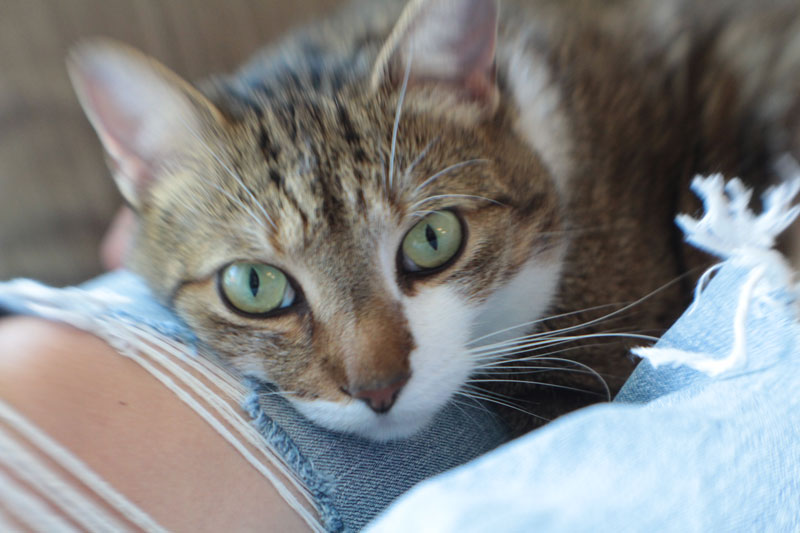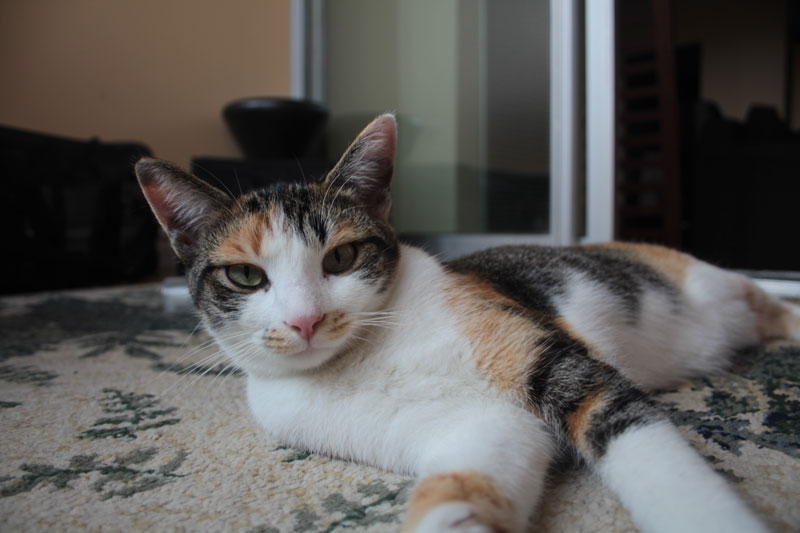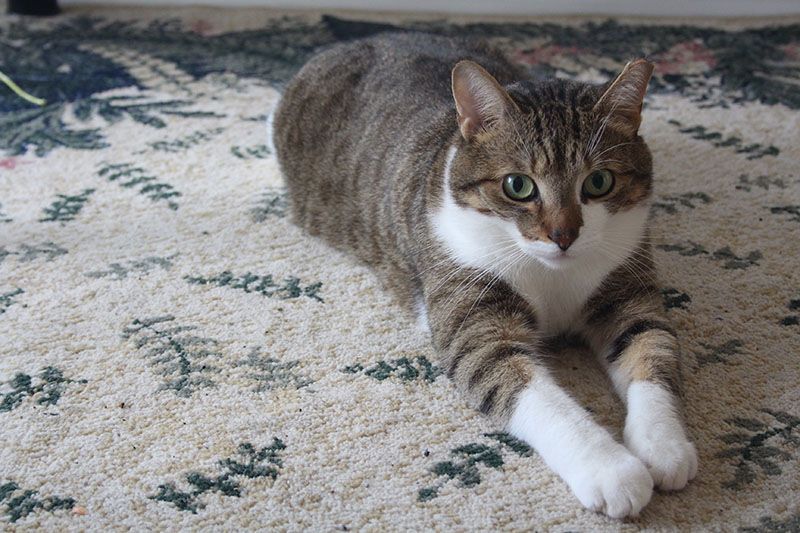A lot of pet parents make the conscious decision to make sure that their cats don’t eat any human food, but if you’re a pet parent who wants to treat their cat with a bit of cooked chicken, what oil should you cook it in?
Are certain oils toxic to cats? Should you use water instead? Does cooking chicken in water even work? Should you simply make a broth or stew out of the chicken?
I’m sure you’ve all heard the craze about olive oil and how olive oil is now considered a superfood.
Have you heard of a superfood? Well, olive oil has been deemed one because it helps with the overall functionality of the body and provides excellent nutrients.
That said, if olive oil is so great for humans, does it mean that it’s suitable for cats?
Let’s break down some facts!
SHORT ANSWER
You can absolutely feed your cat olive oil. However, if you do make sure that you only feed olive oil in moderation.
Not only is olive oil is considered non-toxic to cats and can be a great supplement in their diet.

BENEFITS OF FEEDING YOUR CATS OLIVE OIL
There are several benefits that your cat can get from eating olive oil. However, even though this is true, it is highly recommended that you speak to your vet before supplementing.
1. OLIVE OIL CAN BE A VERY POWERFUL ANTIOXIDANT
Olive oil contains vitamin E, chlorophyll, and polyphenols (which are bio-synthesized plant compounds).
These three components help boost and improve the function of the immune system, making sure that your cat can fight off any germs they come into contact with.
2. THE FATS OLIVE OIL CONTAINS ARE MONOUNSATURATED
Often-times we’re warned that certain oils are terrible for us because they can cause cardiovascular diseases or diabetes. However, olive oil allows fat to burn more efficiently and will help raise your cat’s metabolism.
3. THE FATS INSIDE OF THE OIL ARE GREAT FOR GROWTH AND AGEING
4. OLIVE OIL CAN BE USED AS A WEIGHT-LOSS AGENT
Since olive oil raises the metabolism and the fact that it only has monounsaturated fat, olive oil can help break down fats that are stored in single cells.
Olive oil can help aid cats who have obesity problems or cats that are at risk of strokes (due to being overweight.)
5. OLIVE OIL IS GREAT FOR SUPPORTING MUSCLE FUNCTIONALITY
6. OLIVE OIL CAN CURE CONSTIPATION
If you’ve ever had a constipated cat, you know how expensive medications can be. We learned this the hard way when Beau had his “PU Surgery,” and while I do not recommend giving your cat olive oil if your vet has prescribed something else, I do recommend feeding your cat olive oil if they are beginning to show signs of constipation.
Olive Oil helps to stimulate bowel movements. However, it will make stools softer or even liquid, so don’t overfeed your cat this oil.
7. OLIVE OIL IS GREAT FOR SKIN & FUR!
Olive oil has excellent moisturizing properties that will help improve the shine and softness of your cat’s coat.
8. OLIVE OIL HELPS AID THE PASSING OF HAIRBALLS
9. OLIVE OIL IS A NATURAL CURE FOR EAR MITES
Always check with your vet to make sure that this is the treatment they recommend, but olive oil is used as a cure for clearing out ear mites as well as infections within the ear canal. You can do this by dropping a few drops of olive oil into your cat’s ear.
Again, please check with a vet before you give this treatment, especially if you’re not sure how to put drops into your cat’s ear.

WHICH OLIVE OIL IS BETTER?
If you choose to feed your cat olive oil, you’re going to want to buy extra-virgin olive oil if it’s in the budget/is possible.
Extra-virgin olive oil is less acidic and is not chemically treated, making it safer for your cat to consume. Extra-virgin olive oil is also a much higher quality oil that will ensure your cat doesn’t get sick.
HOW MUCH OLIVE OIL SHOULD I FEED?
As mentioned, I would make sure not to overuse olive oil, and currently, there isn’t a concrete “recommendation” for how much you should feed your cat.
Some experts recommend giving your cat a tablespoon a day if your cat is struggling with constipation and a teaspoon a day for conditioning.
You should always start by feeding your cats small amounts and then increase the feedings.
I would only feel comfortable feeding my cat one teaspoon every three days for conditioning.
HOW SHOULD I FEED MY CAT OLIVE OIL?
You can mix the oil into their wet or dry food.
I would not try to syringe feed olive oil or try to feed it on its own due to its taste.
WHAT HAPPENS IF I FEED MY CAT TOO MUCH OLIVE OIL?
Olive Oil is excellent and has so many benefits, but if overfed, it can do the exact opposite of what you’re trying to achieve.
Some signifiers that you are overfeeding your cat olive oil are:
Your cat may have diarrhea
Your cat may develop dehydrated skin
Your cat may become overweight

IF OLIVE OIL IS SO GREAT, WHY DON’T MORE VETS RECOMMEND IT?
Well, it’s not a matter of vets not recommending it as much as it’s the fact that a lot of foods already contain olive oil inside of them.
That said, take a look at the ingredient list on your cat’s food to make sure you’re not going to overdose your cat with olive oil.
At the end of the day, I always recommend talking to your vet about whether or not olive oil is suitable for your cat.
Not every cat will need an olive oil supplement in their diet, but if your cat suffers from things like constipation or a dry/rough coat, it may be a good idea to talk to your vet about this natural supplement.
CONCLUSION
Olive Oil is a great supplement that I would recommend including in your cat’s diet if they suffer from constipation or a dry/rough coat.
Please always make sure to be safe with the amount of olive oil you give your cat as it can get your cat sick. Make sure you’re “okay-d” by the vet, and you’re good to go!
I personally don’t feel comfortable using olive oil for conditioning (daily feedings).
I would only feed my cat olive oil when they are constipated, when they are having difficulty passing hairballs, or every three days if their skin & fur is getting too dry or brittle (for example in the winter.)
So pet parents & pet lovers, let me know have you included olive oil in your cat’s diet? Did it help with any of these symptoms? Have you had good or bad experiences?
Let us know in the comments below!
My baby is 14 years young!!! His name is Jet! He has minimal hard poop…. I tried pumpkin 🎃… it worked for first few days…. now he back to minimal hard poop. I just gave him extra virgin cold pressed olive oil mixed in with treats! I’m very worried 😦 what should I do ?
Hi April, I definitely recommend taking your cat to the vet to ensure everything is okay with your vet.
I’d also keep a close eye on whether or not your cat is drinking enough or getting enough exercise during the day. A lot of times this causes indoor cats to become constipated.
I ate a tin of sardines in olive oil, and afterwards I left the remains of sardine droppings and olive oil out side in the tin thinking the neighborhood stray cat might like it. When I came out the next morning the tin had been licked so clean it looked like it had been washed. I thinking kitty loved it.
Sounds like the kitty absolutely loved it! Just be careful with tins because of their sharp edges! We don’t want an outdoor kitty cutting themselves.
My seven-year-old gray tuxedo LOVES OLIVE OIL. So much so that he will lick Olive Oil Soap! (Don’t worry, I put it in a drawer after observing him doing that.) I also have to keep my olivewood cooking spoons in a drawer and not in the utensil crock on the counter — cuz he licks them too!
I have given him a taste of the brine from the olive-bar at our Sprouts, but you bring up a good point about the salt added to such products.
I wonder if he is deficient and somehow “knows” it. His coat and skin seem fine except for coarser hair along the spine that he has always had. Since it shouldn’t hurt him, I think I will provide a tsp of EVOO every week or so. If nothing else, it should move me up in his graces, as he dotes on my husband but only tolerates me!
Hey Elizabeth, I would definitely recommend talking to your vet about it at your next visit if you suspect that he has any deficiencies. Deficiencies can have some pretty severe longterm complications and it’s better safe than sorry!
As for getting your cat to like you more than your husband… been there done that! Haha, it took me almost a year for one of our cats to like me just as much as mine!
My 3 yr old black and white Drizzt, is just as bad! But hes obsessed with olive oil AND coconut oil! I had really dry feet at the end of last summer and rubbed olive oil all over my feet n put on sandals around the house, n i sat down for a minute n he instantly started licking between my toes! I went n put socks on and wen i came bak he was licking the inside of my sandals! Haha. N then yesterday i got a chemical butn on my face frm a nee face wash so i bought a big tub o organic unrefined coconut oil n lathered it on my face to soothe the burn, n he started licking my hands and cheeks! Now today, hes laying nxt to the tub of it by my bed crying n giving me sad face! Lol. I dnt kno why hes so obsessed with it. Hes a very picky eater n will not eat any beef or poultry products- only seafood pumpkin cranberry n blueberry foods. I worried maybe he needs it or sumthn but hes had greasy hair since he was 5wks old wen we got him n he drinks ALOT of water like a dog so he doesnt hav dry skin or hair. But im glad to kno my cat is not the only one wandering around the house tryn to sniff out anything with oil on it he can lick.
I found my kitten left ears is dry and small flakes on it.. i’ve tried olive oil i hope its working for my little one.
Hey Sha, dependant on how extreme and where the dryness is you may want to get checked at the vet. (Especially cause the ears can be pretty sensitive, especially on the inside.) Hope everything is better with the kitty soon <3
Thanks for your post. Very informative.
My cat is almost 22 and having a hard time… Totally constipated.. Been to the vet twice for enima’s in the past week. The 2nd’ one barely worked. Now it’s been another 3 days, still nothing happening. The vet, as always, is a complete money gouger. 150 dollars for an enima? C’mon seriously. I’ve ordered a kit for home. I hope I can make it work… He eats and drinks a bit and I give him an IV every day. He really loves olive oil so I’ve been giving him about two table spoons a-day. Still no action.. I know it’s a lot but I’ll try anything at this point… He’s also on vet perscribed medication.. Don’t know what to do!!!
Morrie, I’m so sorry to hear. Is your kitty getting enough water? I know you said you’re giving him an IV, but I’m not sure if it’s for medications or not. Constipation has a lot of causes, like a lack of fibre, dehydration, inactivity, etc. We personally use Pumpkin (Weruva’s Pumpkin Patch Up) if our cats are experiencing constipation. It’s really nice and wet, and you can throw kibble into it if you don’t think your kitty will eat it.
Please keep me updated, but I highly recommend Patch Up!
Johnny, thanks so much for your reply.. Yes, the IV is for water only. He’s also on two different stool softeners . Actually, I got lucky last night and this morning he had movements.! Out of desperation, I let him drink Olive Oil freely yesterday.. He loves it! He must of had 3 -4 teaspoons. or more. It doesn’t seem to bother him and maybe it was the catalyst !
I am putting psillium husk in his food but he doesn’t like it.. And he will not eat pumpkin. I’ll have to check into your recommendation… Thank You.. ,
I don’t know what Kibble is. I looked at the grocery, no luck..
The vet suspects failing kidney’s for his dehydration. His appetite is also decreasing. He drinks lots of water but maybe his kidneys just pass it without absorbtion…
Anyway, he’s almost 22 but I’ll never give up on him! He’s my fierce buddy!
Hey Morrie, I’m glad to hear that he had some movements this morning! That’s exciting news.
Kibble is also known as dry food, so you should have some of that lying around (unless you have him on a full wet diet.)
Kidney Failure is definitely one of the leading causes of dehydration and it’s very common with cats his age. I definitely recommend mixing in extra water in your cat’s food whether it’s wet or dry when they have kidney problems. Any ways you can trick them into drinking more water is good.
Please keep me updated <3
Did you find a solution to the constipation? 22 years old is amazing! What foods have you fed your cat as he has lived long? Thank you.
Very interesting. I did not know that.
Glad to pass on the knowledge!
We get CBD oil sometimes and it’s in olive oil. Just a little bit…but hasn’t hurt us yet.
I’ve never thought about CBD oil for cats, to be honest. I’m glad you brought that up! I’m definitely going to do a bunch of research in it. I know my brother in law takes it for himself when he’s having a hard time sleeping!